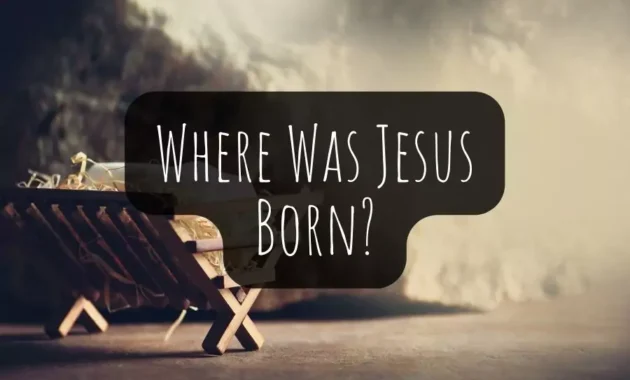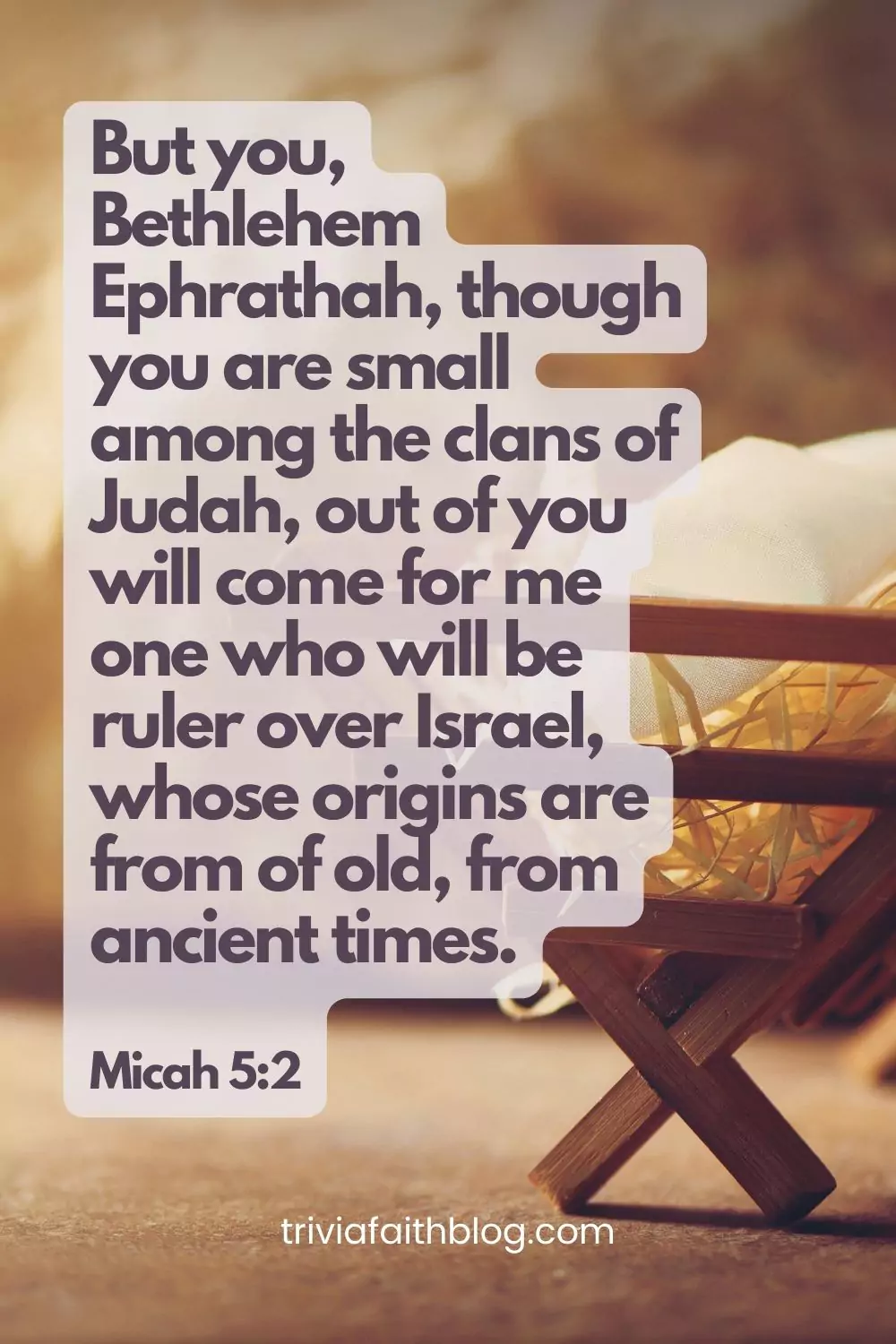Where Was Jesus Born?
As a person of faith, understanding the life and teachings of Jesus Christ is essential to our spiritual journey. Among the many significant events in the life of Jesus, His birth holds a special place in the hearts of believers worldwide.
The story of His birth not only reveals His humble beginnings but also sets the stage for the transformative impact He would have on the lives of countless individuals.
See also: Birth of Jesus Quiz
In this article, we will explore the question, “Where was Jesus born?” and delve into the rich scriptural context surrounding the birth of the Savior.
Join us as we uncover the powerful messages embedded within this miraculous event and discover how it continues to shape our faith today.

Where Was Jesus Born?
According to the Bible, Jesus was born in the town of Bethlehem, located in modern-day Israel. Both the Gospel of Matthew (Matthew 2:1) and the Gospel of Luke (Luke 2:4-7) provide accounts of Jesus’ birth in Bethlehem, fulfilling the Old Testament prophecy in Micah 5:2:
“But you, Bethlehem Ephrathah, though you are small among the clans of Judah, out of you will come for me one who will be ruler over Israel, whose origins are from of old, from ancient times.“
Micah 5:2
The Journey to Bethlehem
Mary and Joseph, Jesus’ earthly parents, were living in Nazareth when it was revealed to them that Mary would give birth to the Son of God. The Gospel of Luke tells us that this miraculous conception took place through the power of the Holy Spirit, and an angel appeared to Mary, proclaiming the good news (Luke 1:26-35).
During this time, the Roman Emperor Augustus issued a decree for a census, requiring everyone to return to their ancestral hometowns to be counted (Luke 2:1-3). As Joseph was a descendant of King David, he and Mary, who was in the advanced stages of her pregnancy, set out on a journey from Nazareth to Bethlehem, the City of David.
As they arrived in Bethlehem, they faced a challenge: there was no room for them in the inn. This led to Jesus being born in a humble manger (Luke 2:7).
“God chose the humblest of beginnings for His Son, demonstrating the importance of humility and simplicity.”
Anonymous
The Shepherds and the Angels
The birth of Jesus was announced to shepherds in the nearby fields by an angel, who proclaimed the good news of the Savior’s birth (Luke 2:8-12). A multitude of angels then appeared, praising God and saying:
“Glory to God in the highest, and on earth peace, goodwill toward men!”
Luke 2:14
The shepherds, filled with wonder and awe, went to see the baby Jesus for themselves and shared the news of His birth with others in the area (Luke 2:16-18).
“The shepherds were the first to hear the good news, reminding us that God’s love is for everyone, regardless of their status or position.”
Anonymous
The Visit of the Magi
The Gospel of Matthew tells the story of the Magi, or wise men, who followed a star to find Jesus (Matthew 2:1-12). The Magi brought gifts of gold, frankincense, and myrrh to honor the newborn King, recognizing His divine nature and prophetic role.
“The gifts of the Magi symbolize the recognition of Jesus as King, Priest, and Savior.”
Anonymous
Key Takeaways from the Story of Jesus’ Birth
The story of Jesus’ birth carries deep spiritual significance and provides valuable insights for all humanity. Here are some key takeaways from the Nativity narrative:
- The fulfillment of prophecy: Jesus’ birth in Bethlehem fulfilled Old Testament prophecies, demonstrating the reliability of the Scriptures and the divine plan of God (Micah 5:2).
- The importance of humility: Jesus’ humble birth in a stable teaches us the value of humility and simplicity in our own lives. God chose the humblest of beginnings for His Son, reminding us that true greatness is not found in worldly circumstances but in our relationship with God.
- The universality of God’s love: The shepherds’ inclusion in the Nativity story illustrates that God’s love extends to everyone, regardless of their social standing or background. Jesus came to save all humanity, and the shepherds were among the first to hear the good news (Luke 2:8-18).
- The power of faith and trust: Mary and Joseph’s arduous journey to Bethlehem, despite the difficulties they faced, exemplifies the importance of faith and trust in God’s plan for our lives (Luke 2:1-7).
- The significance of Jesus’ birth: The Nativity marks the beginning of Jesus’ earthly life and serves as a reminder of the ultimate sacrifice He would make for humanity’s salvation. The birth of Christ is the starting point of His mission to reconcile us with God and offer eternal life to those who believe in Him.
As we reflect on these key takeaways from the story of Jesus’ birth, let us use these insights to deepen our faith and understanding of God’s love for us.
Christian Quotes Relatable to Jesus’ Birth
- “The Son of God became a man to enable men to become sons of God.”
- “The very purpose of Christ’s coming into the world was that He might offer up His life as a sacrifice for the sins of men. He came to die. This is the heart of Christmas.”
- “At this Christmas when Christ comes, will He find a warm heart? Mark the season of Advent by loving and serving the others with God’s own love and concern.”
- “Christmas is the spirit of giving without a thought of getting. It is happiness because we see joy in people. It is forgetting self and finding time for others.”
- “We consider Christmas as the encounter, the great encounter, the historical encounter, the decisive encounter, between God and mankind. He who has faith knows this truly; let him rejoice.”

Bible Verses About The Birth Of Christ
- Isaiah 7:14: “Therefore the Lord himself will give you a sign: The virgin will conceive and give birth to a son, and will call him Immanuel.”
- Isaiah 9:6: “For to us a child is born, to us a son is given, and the government will be on his shoulders. And he will be called Wonderful Counselor, Mighty God, Everlasting Father, Prince of Peace.”
- Micah 5:2: “But you, Bethlehem Ephrathah, though you are small among the clans of Judah, out of you will come for me one who will be ruler over Israel, whose origins are from of old, from ancient times.”
- Luke 1:30-33: “But the angel said to her, ‘Do not be afraid, Mary; you have found favor with God. You will conceive and give birth to a son, and you are to call him Jesus. He will be great and will be called the Son of the Most High. The Lord God will give him the throne of his father David, and he will reign over Jacob’s descendants forever; his kingdom will never end.'”
- Matthew 1:21: “She will give birth to a son, and you are to give him the name Jesus, because he will save his people from their sins.”
- Luke 2:6-7: “While they were there, the time came for the baby to be born, and she gave birth to her firstborn, a son. She wrapped him in cloths and placed him in a manger, because there was no guest room available for them.”
- Luke 2:10-11: “But the angel said to them, ‘Do not be afraid. I bring you good news that will cause great joy for all the people. Today in the town of David a Savior has been born to you; he is the Messiah, the Lord.'”
- John 1:14: “The Word became flesh and made his dwelling among us. We have seen his glory, the glory of the one and only Son, who came from the Father, full of grace and truth.”
Final Thoughts
The story of Jesus’ birth in Bethlehem is not just an account of a historical event; it carries deep spiritual significance for Christians around the globe. As we reflect on the Nativity, let us remember the importance of humility, faith, and God’s unconditional love for all humanity.
May the story of Jesus’ birth inspire us to live lives of love, service, and gratitude, and to share the good news of the Savior’s coming with those around us. Amen!






